Wednesday, September 07, 2005
BIOLOGY - Excretion
EXCRETION
metabolism = anabolism + catabolism
anabolism -> formation of complex substances from simpler substances
catabolism -> breaking down of complex substances into simpler substances
end product of metabolism -> useless, potentially harmful substances
examples:
CO2
H2O
salts
Nitrogenous wastes
- urea (terrestial animals)
- uric acid (reptiles and birds)
- ammonia (aquatic animals)
excretion -> removal of metabolic waste products from the body (=/= defecation)
__________________________
KIDNEY
excretory organ to remove
- urea
- excess water
- excess salt
- toxic, useless materials (potentially harmful)
Renal Artery
alot of urea
excess water and salts
higher level of glucose, aminos and O2
lower level of CO2
Renal Vein
less urea
normal amount of water and salts
lower level of glucose, aminos and O2 (kidney used for respiration, growth etc)
higher level of CO2 (kidney respire)
Nephron
small independet filtering unit
~3cm long
about 1 million in the kidney

this is the kidney. dont worry the real one looks nicer and more happening
---------------------------
blood in renal artery -> arterioles -> capillaries in bowman's capsule
decrease in lumen size
increase in pressure to push substances out
capillaries - cells that are partially permeable
->small molucules filtered out (ultrafiltration) e.g urea water salt glucose amino acids vitamins
-------------------------
at the bowman's capsule, all the small molecules are filtered out from the arterioles
due to a high concentration of glucose, amino acids, vitamins in the nephron
- diffusion and osmosis
after some time... there would be a high concentration in the blood, thus active transports would be used to keep those substances in the blood.
-------
water is absorped back into the blood at the Loop of Henle
- animals adapted to desert climates have longer loop of henle

nephron!
metabolism = anabolism + catabolism
anabolism -> formation of complex substances from simpler substances
catabolism -> breaking down of complex substances into simpler substances
end product of metabolism -> useless, potentially harmful substances
examples:
CO2
H2O
salts
Nitrogenous wastes
- urea (terrestial animals)
- uric acid (reptiles and birds)
- ammonia (aquatic animals)
excretion -> removal of metabolic waste products from the body (=/= defecation)
__________________________
KIDNEY
excretory organ to remove
- urea
- excess water
- excess salt
- toxic, useless materials (potentially harmful)
Renal Artery
alot of urea
excess water and salts
higher level of glucose, aminos and O2
lower level of CO2
Renal Vein
less urea
normal amount of water and salts
lower level of glucose, aminos and O2 (kidney used for respiration, growth etc)
higher level of CO2 (kidney respire)
Nephron
small independet filtering unit
~3cm long
about 1 million in the kidney

this is the kidney. dont worry the real one looks nicer and more happening
---------------------------
blood in renal artery -> arterioles -> capillaries in bowman's capsule
decrease in lumen size
increase in pressure to push substances out
capillaries - cells that are partially permeable
->small molucules filtered out (ultrafiltration) e.g urea water salt glucose amino acids vitamins
-------------------------
at the bowman's capsule, all the small molecules are filtered out from the arterioles
due to a high concentration of glucose, amino acids, vitamins in the nephron
- diffusion and osmosis
after some time... there would be a high concentration in the blood, thus active transports would be used to keep those substances in the blood.
-------
water is absorped back into the blood at the Loop of Henle
- animals adapted to desert climates have longer loop of henle

nephron!